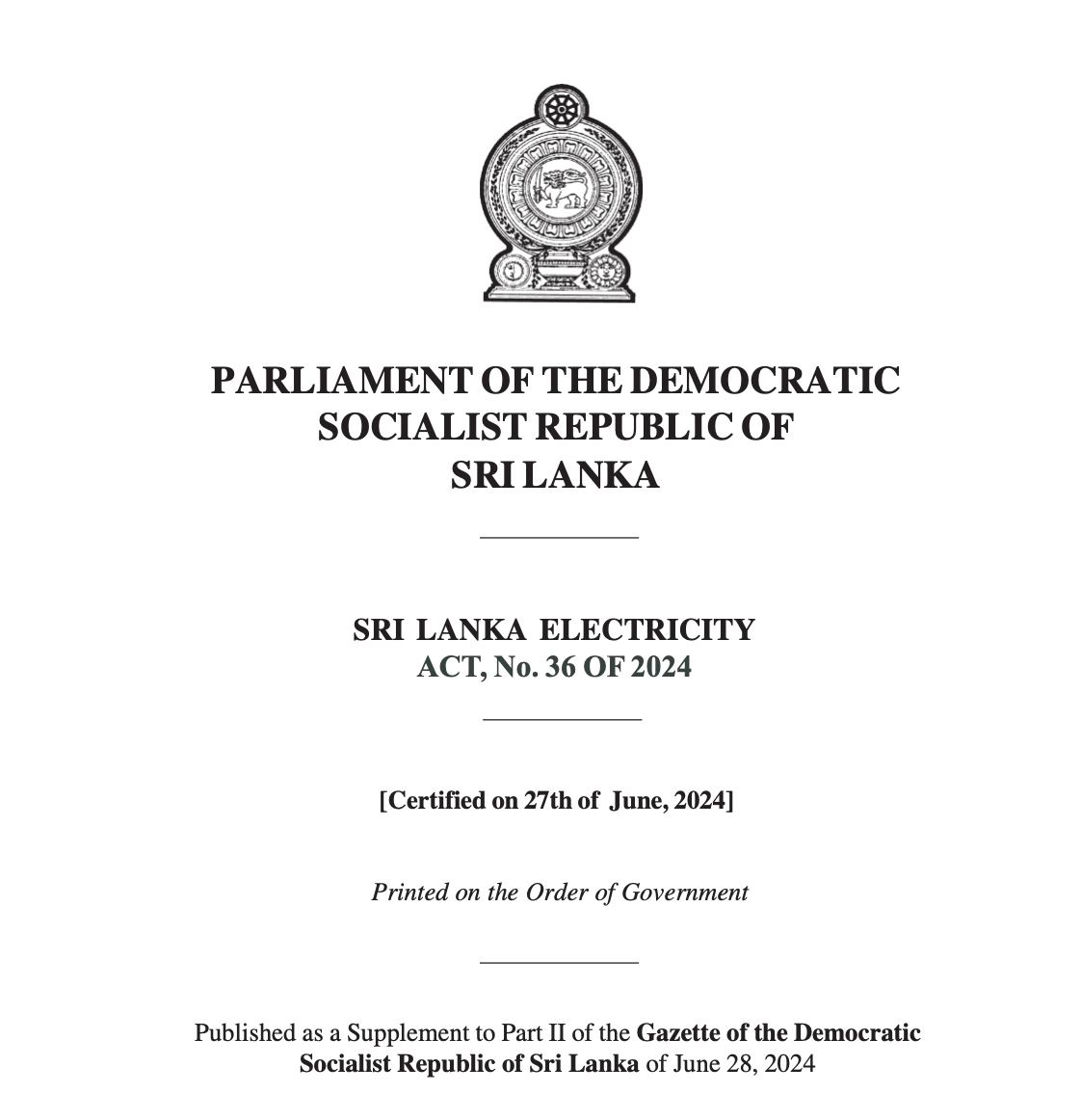The Sri Lanka Electricity Act, No. 36 of 2024, introduces comprehensive reforms across the electricity sector aimed at restructuring management, operations, and policy to improve efficiency, encourage investment, and support renewable energy goals.
- Reform of Institutional Structure: The Act repeals previous electricity legislation, including the Ceylon Electricity Board Act, and mandates the creation of separate corporate entities under the Companies Act. These entities will independently manage generation, transmission, distribution, and procurement activities, shifting from a state-dominated structure to a more competitive market with private-sector participation.
- National Electricity Advisory Council: This Council, comprising experts in policy, economics, energy, and finance, advises on strategic industry reforms, renewable energy integration, and optimal resource use. It aids in developing the National Electricity Policy and Tariff Policy, which aim to enhance consumer affordability, financial sustainability, and efficient service delivery.
- Public Utilities Commission as Regulator: The Commission oversees licensing, performance monitoring, and enforcement to ensure fair practices, competition, and safe operation of the electricity supply network. It sets tariffs, oversees bulk purchases, and conducts audits, working closely with the newly established entities to uphold transparency and accountability.
- National System Operator (NSO): The Act establishes the NSO as a state-controlled entity responsible for real-time power system operations, including generation dispatch, power scheduling, and grid management. The NSO oversees bulk transactions between generation and distribution companies and reports deviations from the approved power plan to maintain optimal, least-cost electricity provision.
- Private Sector Participation and Open Access: To attract private investment, the Act allows for public-private partnerships (PPP) and listing on the stock market. It also mandates open access to the transmission network in a phased manner, promoting competitive procurement of new generation capacity. This includes renewable energy projects that meet set criteria, with potential exemptions for smaller renewable sources and essential emergency generation.
- Transition Plan and Employee Protections: The Act calls for a phased transfer of Ceylon Electricity Board (CEB) assets and liabilities to new companies, managed by a Power Sector Reform Secretariat. Employees are given options to transition to these successor companies with maintained benefits, or opt for a voluntary retirement scheme. A dedicated entity will manage existing CEB pension and provident funds to safeguard employee rights.
- Focus on Renewable Energy and Decarbonization: The Act promotes reducing reliance on fossil fuels, setting goals for renewable energy integration and emissions reduction. The NSO will manage energy storage and ancillary services to support intermittent renewable sources, while incentives will encourage adoption of clean energy technologies.
- Long-Term Planning and Tariff Regulation: The NSO is required to develop a Long Term Power System Development Plan, ensuring that future demand is met affordably while aligning with national decarbonization targets. Tariffs will be adjusted periodically to reflect market realities, maintaining financial stability for operators and ensuring accessible energy costs for consumers.
- Enhanced Consumer Protections and Market Transparency: Consumer interests are safeguarded by transparent, merit-based pricing, non-discriminatory grid access, and stringent safety standards. The Act also ensures that tariffs remain fair and affordable, balancing operational costs with reasonable returns for operators.
- Wholesale Electricity Market: The Act envisions the establishment of a wholesale electricity market to increase competition, drive down costs, and allow for consumer choice, especially as renewable energy capacities expand. This market will allow distribution companies to procure energy competitively, aligning with global trends in electricity market liberalization.
In essence, this Act is designed to modernize the electricity sector, fostering a sustainable, competitive environment that attracts investment and meets Sri Lanka’s energy needs while protecting consumers and prioritizing clean energy.













